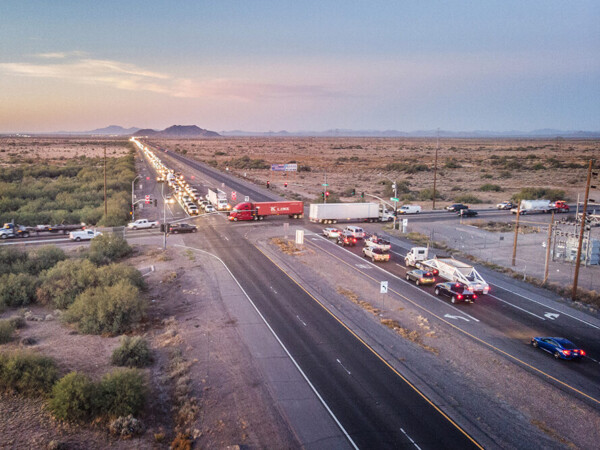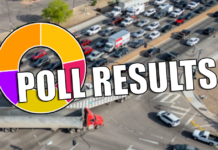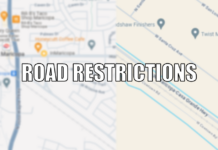After a year of political wrangling in the state legislature, voters will decide whether to extend Prop 400, a half-cent sales tax that funds transportation projects in Maricopa County.
While the referendum may seem like a foreign issue, whether the bond passes next year will have lasting effects on the thousands of Maricopa residents who travel to work every day on State Route 347.
For those making the daily commute north toward Phoenix, the last five miles before reaching Interstate 10 are in Maricopa County and an important part of any enhancement for the long-troubled highway. According to Arizona Department of Transportation statistics, it’s one of the most dangerous in the state.
At a Maricopa town hall in June, ADOT officials released a treasure trove of statistics showing 967 crashes on the highway between July 1, 2017 and June 30, 2022. Over the same five-year period, there were 21 crashes with serious injuries and 15 were fatal.
On the final day of this year’s legislative session, Senate Bill 1102 passed 19-7 in the Senate and cleared the House 43-13, paving the way for a Prop 400 placement on the ballot.
Maricopa County is unique — it’s the only county in Arizona where the state legislature decides whether to bring sales tax referendums to a vote.
Rep. Teresa Martinez (R-Casa Grande) voted in favor of SB 1102 for the second time in as many years.
Martinez represents Legislative District 16, which includes Maricopa and spans into a sliver of Tucson.
“I believe we should have limited government,” Martinez told InMaricopa. “But I also think that the proper role of the government is fixing our roads.”
Martinez vice-chairs the House Committee on Transportation and considers transportation to be the most important issue facing Maricopa.

“I have two major projects — the widening of 347 and I-10 — that affect my constituents,” she said. “There’s 10 miles along I-10 in Maricopa County and five miles of 347 in Maricopa [County] that need widening.”
Last year, Martinez supported a different house bill that would have put Prop 400 on the ballot this year, only to have fellow Republican then-Gov. Doug Ducey veto the bill. He cited concerns that Maricopa County residents could not afford the sales tax tick and would struggle to understand what they were voting for.
“Today, I vetoed a measure to extend a sales tax for transportation funding,” Ducey said in a statement last year. “Across the country, families are facing unprecedented costs for food, gas, housing and other necessities. Now, with inflation higher than it has been in 40 years, is not the time to ask voters in Arizona to tax themselves. Further, if and when voters consider such a proposal, they deserve to cast their ballot for a measure that is responsible and transparent.”
The same inflationary concerns that led Ducey to veto last year’s bill concern Martinez, although for different reasons.
Martinez replaced Rep. Bret Roberts (R-Maricopa), who left in 2021 for the greener pastures of South Carolina. Prior to his departure, Roberts secured $35 million in state funds for the upcoming Riggs Road overpass, which would be built in Maricopa County.
It concerns Martinez that she hasn’t yet seen those funds at work. She wonders if there will even be enough money to fund the project once the construction begins in the coming years.
“We haven’t gotten any of that money yet, and what about the inflationary costs?” she said. “There’s likely to be additional funds needed to finish the overpass. It’s going to have to come from somewhere.”
The passage of SB 1102 was a crucial first step to improving SR 347, said Vincent Manfredi, a Maricopa City Council member who also sits on the Arizona Rural Transportation Advocacy Council.
“SB 1102 gives the people of Maricopa County the ability to decide their transportation funding future,” Manfredi said. “A large portion of the SR 347 sits in Maricopa County, so if the people of Maricopa County vote to extend their transportation tax, it makes expanding the SR 347 more likely to happen.”
After last year’s arduous battle ended in an anticlimactic veto, Martinez wanted more this year and feels she got it.
“It’s not a perfect bill by any means,” Martinez said of SB 1102. “But it’s a good bill and there are a lot of good things in it.”
The original draft by the Maricopa Association of Governments, a group of governmental leaders in and around Maricopa County, leaned away from highways and more toward public transit. That spotlights light rail and buses, to name a few.
It called for more than 40% of the estimated $21.7 billion raised over the next 20 years to funnel into public transit with highways getting just 37% and arterial roads getting the rest.
The bill would have left 5% of the money fluid, meaning that a chunk of those funds could be taken away from highways and moved to public transit, or vice versa.
Martinez pointed out that under the brokered agreement, none of the funds could be shifted from their original earmark. It also increased highway spending by 3%, which may not seem like much, but over the course of 20 years, it means roughly $670 million more for highways.
The deal also included Democratic Gov. Katie Hobbs signing a separate GOP bill that banned municipalities from collecting renters’ tax, an offering she’d vetoed earlier this year.
Prop 400 will go before Maricopa County voters in the fall of 2024. If passed, it will mark the third time voters have supported the tax, which was first approved in 1985 and extended in 2004.
Going against the grain
![Rep. Teresa Martinez smiles as attendees applause at the end of her legislative presentation to the Maricopa City Council in City Hall on June 6, 2023. [Monica D. Spencer]](https://www.inmaricopa.com/wp-content/uploads/2023/06/mdspencer-060623-teresa-martinez-concerned-adot-run-amok-web-03-600x400.jpg)
She said she went “against the grain” of her party and shouldered bitterness from her own side of the aisle to support the referendum.
When the topic was broached again recently, that sour taste returned to her mouth.
“We went through so much last year to get that thing passed,” Martinez said. “This year, when someone asked me if I was going to support it, I was asking myself, ‘Do I want to go through this rigmarole again?’”
While last year may have been an exercise in frustration, Martinez said her answer was never in doubt. She wasn’t going to back away from the fight.
“A few months ago, we had a little girl get killed on 347,” Martinez said. “I’m going to do everything I can to get money to fix these roads.”
The girl that Martinez spoke of was 10-year-old Suheiry Fernandez, who in March, died in a multi-car crash on SR 347.
Editor’s Note: Councilmember Vincent Manfredi is an owner of InMaricopa.
This story was first published in the September edition of InMaricopa Magazine.

![347 Intersections The intersection of 347 and I-10, taken July 3rd, 2023. [Bryan Mordt]](https://www.inmaricopa.com/wp-content/uploads/2023/08/Riggs-Road-and-SR-347-scaled.jpg)







![City gave new manager big low-interest home loan City Manager Ben Bitter speaks during a Chamber of Commerce event at Global Water Resources on April 11, 2024. Bitter discussed the current state of economic development in Maricopa, as well as hinting at lowering property tax rates again. [Monica D. Spencer]](https://www.inmaricopa.com/wp-content/uploads/2024/04/spencer-041124-ben-bitter-chamber-property-taxes-web-218x150.jpg)


![Alleged car thief released without charges Phoenix police stop a stolen vehicle on April 20, 2024. [Facebook]](https://www.inmaricopa.com/wp-content/uploads/2024/04/IMG_5040-218x150.jpg)




